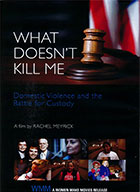
What Doesn’t Kill Me: Domestic Violence and the Battle for Custody 2017
Distributed by Women Make Movies, 115 W. 29th Street, Suite 1200,New York, NY, 10001; 212-925-0606
Produced by Rachel Meyrick
Directed by Rachel Meyrick
DVD , color, 81 min.
General Adult
Domestic Violence, Law, Spouse Abuse, Women
Date Entered: 06/26/2018
Reviewed by Jeanette Aprile, University at BuffaloRachel Meyrick’s What Doesn’t Kill Me: Domestic Violence and the Battle for Custody is the emotional story of women trapped in an impossible choice: escape violence, or lose their children. This powerful film demonstrates how abusers commonly use custody battles to maintain control and domination over their families. The first-hand experiences described in the film are detailed, heartfelt, and at times shocking. Meyrick’s depiction of America’s family court system, from Oklahoma to New York, is one of a deeply flawed bureaucracy which prioritizes paternal involvement over child safety, and that all too-often bends to clichéd representations of hysterical women.
What Doesn’t Kill Me confronts patronizing misconceptions about domestic violence – that it is easy to leave, and that women who stay are the victim of their own bad choices. The viewer is challenged to reconsider notions about the ease of escape. The title, which omits “…makes me stronger,” successfully conveys the ongoing pain and uncertainty that abused women endure. The film states that “one in four women will experience domestic violence in their lives,” and that children are the battered wife’s “Achilles’ heel.” Freedom from violence may come at a painful price, as over a million mothers have lost custody of their children to abusers after leaving the relationship.
The strength of this film is in the personal stories and touching details described by survivors. The film begins and ends with the charismatic and articulate Charlotta Harrison, an 86-year old survivor of abuse at the hands of her husband Fred. An eerie soundtrack mirrors the haunting quality of Charlotta’s home where she shows remnants of life with her husband – scars on the doors, and objects he struck her with. The women’s candid accounts and those of their children are in themselves a persuasive criticism of the family court system. In the film’s most heartbreaking moments we witness the joyful birth of one woman’s daughter, only to find the baby unexpectedly removed from the hospital by DHS (the Department of Human Services). Rachel Meyrick achieves her objective in emotionally involving the viewer with the families’ plights.
The film perhaps does not delineate clearly enough, however, between custody that is taken from mothers and given to DHS and custody that is given to abusive fathers. Many women hesitate to report abuse for fear of intervention by DHS, and in worse case scenarios, fathers who abuse their children are awarded partial or full custody. But explanation of the law is not the primary purpose of this nuanced and evocative film – its purpose is to allow the viewer perspectives of domestic violence survivors who have lived to face the family court system, and to better understand how children experience abuse between parents.
What Doesn’t Kill Me: Domestic Violence and the Battle for Custody is recommended for the deeply personal insight it brings to the experiences of women and children attempting to flee family violence. The film touches upon many little-known challenges that are faced by victims and which continue to play against women in family court. Other topics include The Child Safety Act, The Quincy Solution, DHS intervention, challenges to custody, and child emancipation.
Meyrick’s work overall is informative as well as deeply moving. Charlotta’s triumphant smile and wave goodbye leaves the viewer with a sense of optimism and the impression that survival is still worth escape. Thus this film is inspirational and informative viewing for anyone interested in understanding more about violence within families, or about domestic violence advocacy. It is recommended for public library and university collections.
Awards
- Special Jury Activist Award Winner